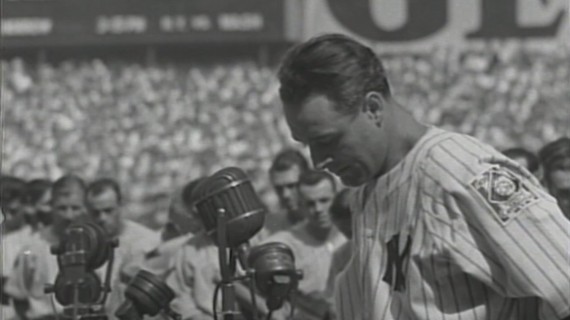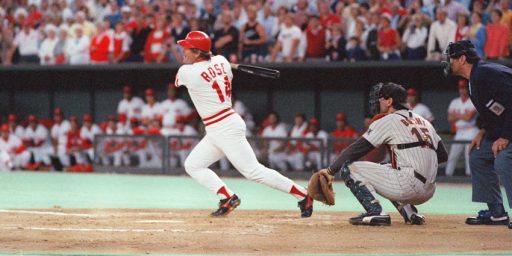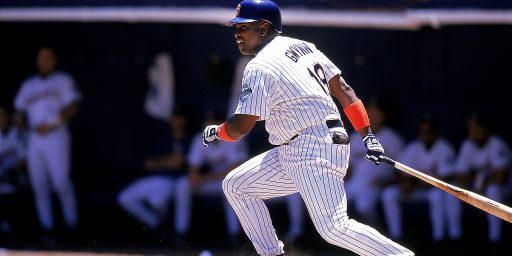75 Years Ago, Lou Gehrig Gave His Farewell Address
Seventy five years ago today, the career of one of the best known sports figures of his time was brought to an abrupt end thanks to a disease that now bears his name:
The distinctive sentence structure and New England accent stay with us 54 years after JFK delivered, “Ask not what your country can do for you …” And most grammar-school students can identify the words, “Four score and seven years ago” even though such time-telling phrasing has been gone for seven score and 11 years. Every January we embrace the “I have a dream” speech Martin Luther King Jr. delivered in 1963 at the Lincoln Memorial. And though we have endured too many subsequent days of infamy, we readily recall the one so designated by FDR in 1941.
We love speeches, don’t we? Give us a good one, and we’ll hang on to it for decades. Our kids will memorize it, our candidates will steal from it, our comics will distort it. And some folks might change their thinking because of it. But no one will forget it.
A great speech has a life expectancy comparable to that of the Himalayas. And it can move mountains.
A nation that is sitcom-obsessed and routinely finds humor — of the gallows variety — in tragedy will warm up to a heart attack-serious speech and salute the man at the microphone for decades. The written word has power and sway. The spoken word, to use a baseball term, has pop.
The speeches we embrace most fervently are powerful, persuasive and, in many cases, presidential. In all cases, they are political — except the one delivered 75 years ago today on a baseball diamond in the South Bronx. Lou Gehrig was apolitical, as far as we know. He wasn’t the president of anything.
On July 4, 1939, however, he made history with words that still resonate as if they redirected the course the country would follow. That he delivered his speech on the nation’s birthday was as appropriate as his fate was ironic. The man who appeared in 2,130 consecutive games, a man renowned and respected for his durability, would be felled before his 40th birthday.
His speech was a declaration of inspiration.
The farewell speech of the great first baseman-slugger, the Yankees’ first captain, the almost instant Hall of Famer and revered Iron Horse was brief, 275 words, but as powerful as anything Gehrig did with a bat in his hands.
He found a glimmer of good in a winding-down experience that many Americans considered profoundly sad and tragic. And he emphasized how fortunate and grateful he was. He had been stricken by a disease that would end his life nearly two years after he spoke that day at Yankee Stadium, 17 days short of what would have been his 38th birthday.
And though his already compromised body merely hinted at his weakness — a once-strapping body slumped slightly as he spoke, and he was unable to hold the gifts bestowed on him that day — his words provided only a veiled reference to the dreadful disease that took his life, amyotrophic lateral sclerosis.
Much of what Gehrig said that day seldom is heard these days. We know best the thoughts that have been spliced together by the first people who favored soundbites more than whole thoughts.
Today, Major League Baseball will honor Gehrig and the anniversary of the speech, as well as undertake other efforts throughout the month of July to raise awareness of Amyotrophic lateral sclerosis, the disease that he suffered from. It started the other day, with a ceremony at Yankee Stadium since the Yankees will not be playing at home today. Among other things that have already happened, there is the release of this video from MLB in which every starting First Baseman in the league recites a part of the speech:
But, of course, the original is still the best:
Fans, for the past two weeks you have been reading about the bad break I got. Yet today I consider myself the luckiest man on the face of the earth. I have been in ballparks for 17 years and have never received anything but kindness and encouragement from you fans.
Look at these grand men. Which of you wouldn’t consider it the highlight of his career just to associate with them for even one day? Sure, I’m lucky. Who wouldn’t consider it an honor to have known Jacob Ruppert? Also, the builder of baseball’s greatest empire, Ed Barrow? To have spent six years with that wonderful little fellow, Miller Huggins? Then to have spent the next nine years with that outstanding leader, that smart student of psychology, the best manager in baseball today, Joe McCarthy? Sure, I’m lucky.
When the New York Giants, a team you would give your right arm to beat, and vice versa, sends you a gift – that’s something. When everybody down to the groundskeepers and those boys in white coats remember you with trophies – that’s something. When you have a wonderful mother-in-law who takes sides with you in squabbles with her own daughter – that’s something. When you have a father and a mother who work all their lives so you can have an education and build your body – it’s a blessing. When you have a wife who has been a tower of strength and shown more courage than you dreamed existed – that’s the finest I know.
So I close in saying that I may have had a tough break, but I have an awful lot to live for. Thank you.
For an entirely extemporaneous speech, that’s pretty darn good.






Doug, thank you for posting this.
(My aunt had AMS. Died after suffering with it for more than 15 years. One reason why I decided to not have children.)
My biological dad die of ALS in only a few years after his symptoms started 🙁